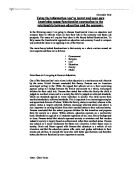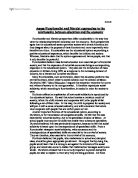Using the information you've learnt and your own knowledge assess functionalist approaches to the relationship between education and the economy.
Alexander Ford
Using the information you’ve learnt and your own knowledge assess functionalist approaches to the relationship between education and the economy.
In the following essay I am going to discuss Functionalist views on education and compare them to Marxist views on how they link to the economy and future job prospects. The essay will explore key ideas in the theory behind functionalism. To fully assess the Functionalist approach on education and economy I need to compare and contrast the ideas to an opposing view of the Marxist.
The main theory behind functionalism is that society as a whole evolves around six main aspects and these are as follows :
- Government
- Religion
- Law
- Education
- Family
- Media
From these six I am going to focus on Education.
One of the functionalists’ main views is that education is a meritocracy and a theorist by the name Talcott Parsons concluded this theory. Parsons was an American sociologist writing in the 1950s. He argued that schools act as a focal socialising agency, acting as a bridge between the family and society as a whole, and prepare children for their adult role. Parsons then stated that within the family the child is judged on ascribed values and in a society the child is judged on achieved standards, which are standards applied to every individual in society. The child moves from ascribed standards to achieved standards. This is important in an increasingly complex and specialised division of labour. Within the family, status is ascribed, whereas in the school, status is largely achieved. Schools encourage achieved status and school is also important in moving children from their ascribed status to their achieved status. Parsons concluded that the school prepares children for this transition and prepares them for society as a whole. Within schools, education operates on a meritocratic basis. Standards are applied to all students regardless of sex, race, family background or class. Parsons stated that schools represent society in miniature and that modern industrial society is largely based on achievement rather than ascribed status. Parsons saw schools as a major mechanism for future role allocation in their future roles in society. Davis and Moore agreed with Parsons that education is a vehicle of role allocation and that the education system sifts, sorts, and grades individuals to their talents and abilities. It rewards the most able with better qualifications and therefore better jobs that are functionally more important to society.







